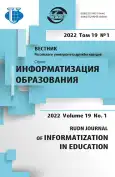Digital transformation: basic approaches to defining the notion
- 作者: Shelepaeva A.K.1
-
隶属关系:
- Financial University under the Government of the Russian Federation
- 期: 卷 19, 编号 1 (2022)
- 页面: 20-28
- 栏目: INFORMATIZATION OF EDUCATION: A GLOBAL PERSPECTIVE
- URL: https://journal-vniispk.ru/2312-8631/article/view/321318
- DOI: https://doi.org/10.22363/2312-8631-2022-19-1-20-28
- ID: 321318
如何引用文章
全文:
详细
Problem statement. Changes in society in connection with the diversity of the use of information and communication technologies, has led to the active use of the concept of “digital transformation.” A complex polysemic notion describes a multifactorial phenomenon, which necessitates an interdisciplinary approach to the analysis of the concept’s content. Methodology. This study used bibliometric analysis of the Russian electronic database with built-in analysis tools. The quantitative and qualitative characteristics of open sources on the topic of “Digitalization of education” were analyzed using closed search systems and machine analysis of large texts, such as Microsoft Academic Graph and Dimensions.ai. Content analysis and thematic monitoring were carried out using the keywords “digitalization of education,” “digital transformation,” and “digital transformation of higher education.” The assessment of the level of interest in this topic was carried out according to the statistics of queries using the wordstat.ru resource. Results. The term “digital transformation” analyzed in a broad context. Digital transformation is defined using philosophical and cultural approaches. The axiological approach sets a broad framework for discussion and requires additional research. Conclusion. A sample of both Russian and foreign works on the problem of digital transformation was made using various means of statistical analysis. Three approaches to the analysis of digital transformation are considered, definitions are formulated and the need to study the transformation of education using an anthropological approach is substantiated.
作者简介
Albina Shelepaeva
Financial University under the Government of the Russian Federation
编辑信件的主要联系方式.
Email: akshelepaeva@fa.ru
ORCID iD: 0000-0002-4678-9671
Candidate of Pedagogical Sciences, Associate Professor of the Department of Business Informatics
49 Leningradskii Prospekt, Moscow, 125993, Russian Federation参考
- Chernyshov AG. Strategy and philosophy of digitalization. Vlast'. 2018;(5):13–21. (In Russ.)
- Stolterman E, Croon Fors A. Information technology and the good life. Information Systems Research: Relevant Theory and Informed Practice. Boston: Springer; 2004. p. 687–692. https://doi.org/10.1007/1-4020-8095-6_45
- Ahromeeva TS, Malineckij GG, Posashkov SA. Meanings and values of digital reality: the future, wars, synergetics. Russian Journal of Philosophical Sciences. 2017;(6):104–120. (In Russ.)
- Galkin DV. Digital Culture: methodological issues in the study of cultural dynamics. International Journal of Cultural Research. 2012;(3(8)):11–16. (In Russ.)
- Kuznecova TF. Digital culture in the light of the theoretical foundations of the new institutional economy. Vek Globalizacii. 2019;(2):111–120. (In Russ.)
- Gnatysheva EV, Salamatov AA. Digitalization and the formation of digital culture: social and educational aspects. Bulletin of the Chelyabinsk State Pedagogical University. 2017;(8):19–24. (In Russ.)
- Hartl E, Hess Th. The role of cultural values for digital transformation: insights from a Delphi study. Twenty-Third Americas Conference on Information Systems, AMCIS 2017, August 10–12, 2017, Boston, USA. Boston; 2017.
- Lopatina NV. Culture and family: interaction of social institutions in the context of informatization. The Bulletin of Moscow State University of Culture and Arts. 2012; (2(46)):47–52. (In Russ.)
- Raichle ME, MacLeod AM, Snyder AZ, Powers WJ, Gusnard DA, Shulman GL. A default mode of brain function. Proceedings of the National Academy of Sciences of the United States of America. 2001;98(2):676–682. http://doi.org/10.1073/pnas.98.2.676
- Prohorov A, Konik L. Digital transformation. Analysis, trends, world experience. Moscow: Al'yansPrint; 2019. (In Russ.)
- Vajndorf-Sysoeva ME, Subocheva ML. Digital education as a system-forming category: approaches to definition. Bulletin of Moscow State Regional University. 2018;(3):25–36. (In Russ.)
补充文件









